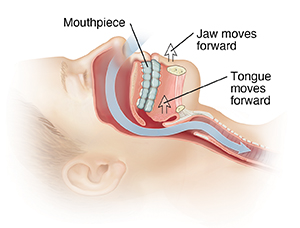Mouthpieces for Sleep Apnea
For simple snoring or mild to moderate sleep apnea, a special mouthpiece may help. Your doctor will diagnose your breathing problem. Then you'll get a prescription for the mouthpiece. Mouthpieces are also called oral appliances. You'll be referred to a dentist who can make a mouthpiece just for you. A follow-up sleep study checks how well the device is working for you. The dentist will then provide ongoing care. They'll make sure your mouthpiece fits well and stays comfortable. Many different mouthpieces are available, so follow directions for your specific device.
 |
| Moving the jaw and tongue forward with a mouthpiece can open the airway to reduce sleep apnea. |
Moving the jaw forward
Most mouthpieces move the jaw and tongue forward. That keeps the tongue from blocking the airway. Mouthpieces can work well. But they are not for everyone. Work with your doctor and dentist to get a mouthpiece that fits you just right. Stay away from using over-the-counter mouthpieces. They often don't work.
Tips
Keep these tips in mind:
-
It will take a while to get used to wearing a mouthpiece. At first it may feel uncomfortable. It may make your mouth water. Tell your doctor if these problems last.
-
Expect several rounds of adjustments to get the mouthpiece to fit and work just right.
-
Mouthpieces don’t cure the problems that cause snoring or sleep apnea. You'll need to use your mouthpiece all night, every night.
-
Follow your doctor’s directions for keeping the mouthpiece clean.
-
Store your mouthpiece in its case when you're not wearing it.
Online Medical Reviewer:
Daphne Pierce-Smith RN MSN
Online Medical Reviewer:
Mahammad Juber MD
Online Medical Reviewer:
Rita Sather RN
Date Last Reviewed:
5/1/2025
© 2000-2025 The StayWell Company, LLC. All rights reserved. This information is not intended as a substitute for professional medical care. Always follow your healthcare professional's instructions.